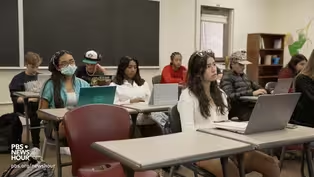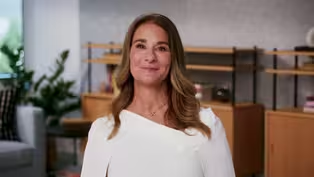
Settlement would stop U.S. from separating migrant families
Clip: 10/17/2023 | 6m 25sVideo has Closed Captions
Settlement would stop U.S. government from separating families at border
A proposed settlement from the Biden administration would allow migrant families who were separated from their children at the southern border to stay in the U.S. for three years and apply for asylum while getting aid. If a judge accepts the settlement, it would also prevent the government from separating families for at least eight years. Amna Nawaz discussed more with Lee Gelernt of the ACLU.
Problems playing video? | Closed Captioning Feedback
Problems playing video? | Closed Captioning Feedback
Major corporate funding for the PBS News Hour is provided by BDO, BNSF, Consumer Cellular, American Cruise Lines, and Raymond James. Funding for the PBS NewsHour Weekend is provided by...

Settlement would stop U.S. from separating migrant families
Clip: 10/17/2023 | 6m 25sVideo has Closed Captions
A proposed settlement from the Biden administration would allow migrant families who were separated from their children at the southern border to stay in the U.S. for three years and apply for asylum while getting aid. If a judge accepts the settlement, it would also prevent the government from separating families for at least eight years. Amna Nawaz discussed more with Lee Gelernt of the ACLU.
Problems playing video? | Closed Captioning Feedback
How to Watch PBS News Hour
PBS News Hour is available to stream on pbs.org and the free PBS App, available on iPhone, Apple TV, Android TV, Android smartphones, Amazon Fire TV, Amazon Fire Tablet, Roku, Samsung Smart TV, and Vizio.
Providing Support for PBS.org
Learn Moreabout PBS online sponsorshipAMNA NAWAZ: A new proposed settlement from the Biden administration would allow migrant families who were separated from their children at the Southern border to stay in the U.S. for three years and apply for asylum while getting aid.
More than 4,000 children were separated from their families during the Trump administration as part of a zero-tolerance policy.
Officials have identified and reunited just over 3,000 kids since then.
If a judge accepts the settlement, it would also prevent the U.S. government from separating families for at least eight years.
The case was brought in large part by the ACLU, which settled with the government.
Its lead counsel, Lee Gelernt, joins me now.
Lee, welcome back.
Thanks for joining us.
LEE GELERNT, Attorney, American Civil Liberties Union: Thanks for having me back.
AMNA NAWAZ: Now, Lee, as part of this settlement, families will receive up to a year of housing and legal and medical behavioral health aid.
Family members are allowed to live in the U.S. under parole while their asylum claims are processed.
Other family members who were previously denied asylum can reapply.
Those feel like very broad terms.
What's your reaction to this settlement?
LEE GELERNT: Yes, we're very happy with the settlement for the families.
I mean, we have been negotiating this for two-and-a-half years, and we are pleased that we have finally reached an agreement.
And, as you said, there are two basic parts to the settlement.
The first part is backward-looking to provide benefits for the families that were brutally separated under the Trump administration.
The Biden administration will help us find the remaining families, reunify them at government expense, and the U.S. provide certain housing, medical, legal assistance, parole to remain in the country, work with authorization, and, most importantly, a specialized process for them to seek asylum so they're never sent back again.
The second part of the settlement, which you also mentioned, was indispensable from our standpoint, which was, going forward, no more zero-tolerance policies.
And that lasts for eight years.
If any future administration tries to do it again, we would be back in court showing the settlement.
After eight years, hopefully, no administration is ever thinking about this again.
But if so, we would go back and simply file a new constitutional challenge based on the precedent.
So we are thrilled for these families.
There's a lot of work to implement.
There are still, as you said, up to 1,000 children, we believe, not with their parents.
This is now years later.
These children have largely grown up not knowing their parents.
There's a lot of work to be done, but this is a critical start.
AMNA NAWAZ: We know the administration had previously stated their intention to make good on some of this earlier.
Here in fact is what the secretary of homeland security, Alejandro Mayorkas, said back in October of 2021.
ALEJANDRO MAYORKAS, U.S. Secretary of Homeland Security: We believe that these families, given what we have done to them, deserve to be able to be in the United States, to remain in the United States and not suffer instability anymore.
AMNA NAWAZ: Now, Lee, this issue of instability, you mentioned the specialized asylum process.
We know a number of asylum claims are eventually denied, even if they take months or years to process.
Is there any guarantee for these families or could they eventually end up having their asylum claims rejected and being deported?
LEE GELERNT: So you're putting your finger on exactly the right point.
We needed Congress, and only Congress can do it, to grant green cards to ensure that all these families, in which our U.S. government intentionally afflicted harm on them, remain in this country and not re-separated, not sent back to danger.
That was the only way of guaranteeing it.
That moment seems to have passed, although I hope Congress will consider again trying to do that.
But, in the meantime, what we could do with the executive branch was this specialized asylum process.
We hope that the families who are deserving of asylum get asylum.
You're absolutely right.
Some of these families could be denied asylum and sent back home.
AMNA NAWAZ: We know the administration is still working to reunite some thousand families or so who were separated.
Do you have any update on those efforts?
LEE GELERNT: So, they fall into a variety of categories.
Some, we just still haven't found.
And that's because the Trump administration didn't keep records.
And we and our partners are looking all over the world for these families.
We hope to find them.
We will not stop until we find them.
Some are in a better situation.
We have contacted them, and they're in the queue to come back.
And so, hopefully, within the next few months, many, many more will come back.
But the judge asked us right in the beginning of the case, do you expect find all these families?
And we said, we really don't know, but we won't stop trying until every last one is found.
And that's all we can do at this point.
We have been working on it for years, and we will continue working on it for as many more years as is necessary.
AMNA NAWAZ: Lee, when you step back and reflect on this moment in time, this practice of separating children from their families, it's really one of the darkest chapters in our modern history and had echoes of previous dark chapters, right, our times of enslavement and internment and so on.
Does this settlement, does this moment, does this offer sort of an end to that chapter of sorts?
LEE GELERNT: Yes, again, I think you're asking the exact right question.
It is one of the darkest chapters.
I have been doing this work for more than three decades at the ACLU.
This is far and away the worst thing I have ever seen, gratuitous, intentional cruelty, little babies being pulled apart, screaming and begging, don't take me away, don't take me away.
This settlement is a critical start.
But, again, as you said, it can't make everything right.
It won't erase this chapter from U.S. history.
And it also won't ultimately make all the families whole.
I mean, these children and parents were so traumatized.
One family we just were working with, a 3-year-old boy was separated for 10 weeks.
By the time he got home, he would just stand by the window looking to see if men were going to come and take him away again.
I think that's what we're dealing with, thousands of little children who were traumatized, this sense of vulnerability that anything could happen to them.
So, no, this settlement won't make everything OK, but it's a critical start, in our view.
And we know the perfect can't stand in the way of doing what we can.
AMNA NAWAZ: That is Lee Gelernt of the ACLU joining us tonight.
Lee, thank you.
We appreciate it.
LEE GELERNT: Thank you for having me.
Admissions essays more important after affirmative action
Video has Closed Captions
Clip: 10/17/2023 | 7m 41s | College admissions essays more important for students after end of affirmative action (7m 41s)
A Brief But Spectacular take on making birth safer
Video has Closed Captions
Clip: 10/17/2023 | 3m 47s | Melinda French Gates' Brief But Spectacular take on making birth safer for moms and babies (3m 47s)
Families of Americans kidnapped by Hamas describe anguish
Video has Closed Captions
Clip: 10/17/2023 | 6m 29s | Families of Americans kidnapped by Hamas describe anguish and what they want Biden to do (6m 29s)
Hundreds killed in strike on Gaza hospital as war worsens
Video has Closed Captions
Clip: 10/17/2023 | 13m 36s | Hundreds killed in strike on Gaza hospital as Israeli-Hamas war worsens (13m 36s)
A look at Jim Jordan's often controversial record
Video has Closed Captions
Clip: 10/17/2023 | 11m 11s | A look at Jim Jordan's often controversial record in Congress (11m 11s)
Providing Support for PBS.org
Learn Moreabout PBS online sponsorship
- News and Public Affairs

FRONTLINE is investigative journalism that questions, explains and changes our world.

- News and Public Affairs

Amanpour and Company features conversations with leaders and decision makers.












Support for PBS provided by:
Major corporate funding for the PBS News Hour is provided by BDO, BNSF, Consumer Cellular, American Cruise Lines, and Raymond James. Funding for the PBS NewsHour Weekend is provided by...




